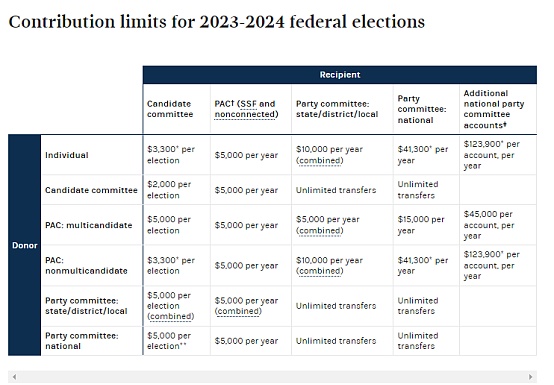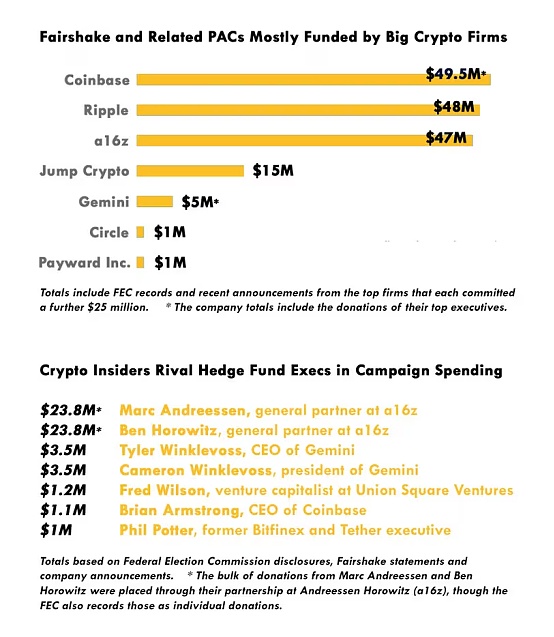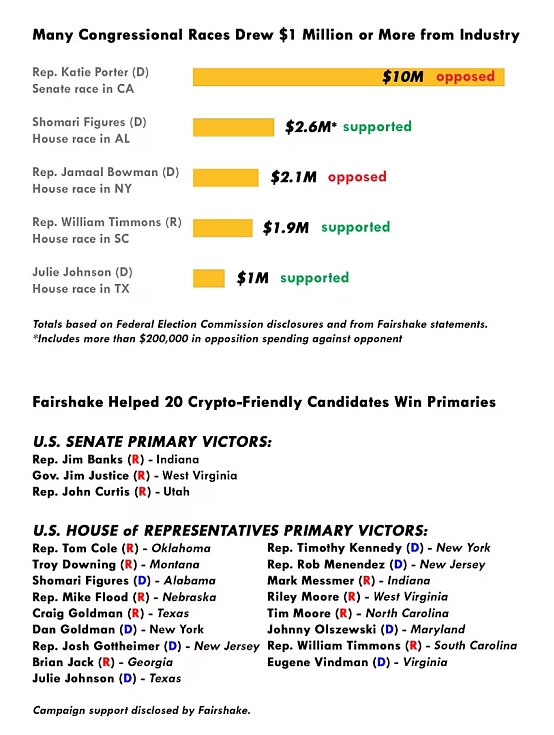Source: Coindesk Compiled by: Ning
In political elections, money can make a difference This proverb is vividly reflected, and the direct product is the unique political action committee (PAC). Various types of donors influence elections through different PACs to determine political roles that are beneficial to themselves.
Encryption is no exception. At present, the encryption industry has accumulated huge campaign funds, and PACs with up to 169 million US dollars have been able to organize a large number of campaign activities and even determine the composition of next year’s Congress to a certain extent. The results are also quite remarkable. The PAC has achieved more than 20 electoral victories, including the elections in California and New York just completed this week.
From a strategic point of view, the political operation of the encryption industry follows the successful model of the congressional campaign two years ago, but this time, there is more money in cryptocurrency - — comparable to top industries flourishing in politics and key supporters of major political parties. Yet those responsible for using the funds are reluctant to discuss it much.
CoinDesk asked repeatedly over the course of months who is in charge and how the decisions will be made using the funds amassed by industry leaders, but holds most of the The funding’s Fairshake political action committee declined to answer questions about the PAC’s management, coordination and decision-making, and core backers — Coinbase, Ripple and a16z — were similarly silent.
By analyzing the federal campaign contribution disclosures of more than two dozen prominent business leaders and leading companies, a picture of crypto that is rapidly expanding its political influence begins to emerge. Most of the money was raised through Fairshake's coordinating PAC, which is affiliated with the Democratic-aligned Protecting Progress Committee and the Republican-aligned Committee to Defend American Jobs. The crypto industry is also using a dark money group, the Cedar Innovation Foundation, to push crypto forward in the critical but delicate battleground of Ohio.
PAC funds poured into the primary election, to a certain extent far exceeding the candidates' personal fundraising. However, due to regulations, such as Fairshake's So-called super PACs do not donate directly to campaigns. Instead, they buy ads for or against candidates, with theoretically unlimited purchases. For example, when a primary candidate relies entirely on individual donations and donations are capped at just $3,300 per election, an opponent could receive millions of dollars in funding from Fairshake.

Cryptocurrency proponents explain massive campaign spending: Tens of millions of American voters want the government to accept crypto assets and tailor rules for them, but that call has gone unheeded.
Faryar Shirzad, chief policy officer of Coinbase, said in an interview: "We found that crypto voters have almost no say in the political process, and the relationship between policymakers and the American public There is a huge disconnect.” Wall Street giant Goldman Sachs also mentioned that “broader policies and political spending are aimed at allowing people to evaluate things more freely.”
Ironically, however, PAC-funded ads typically do not mention cryptocurrency, let alone advocate for it.

When contacted by CoinDesk, Coinbase said it could respond to questions about political participation, but declined to disclose specific decisions about the company's nearly $50 million donation. Ripple and a16z Crypto were also asked similar questions, trying to understand how the PAC was set up, who managed it, and how the donor's wishes were communicated to the manager, but both refused to answer.
Coinbase disclosed in a filing with the U.S. Securities and Exchange Commission that "in December 2023, we formed in partnership with other cryptocurrency and blockchain market participants Fairshake PAC to support political candidates in the 2024 U.S. presidential election who support cryptocurrency and blockchain innovation and responsible regulation.”
However. , a spokesperson for Fairshake said that despite recent news that some leaders support former President Trump, the PAC does not intend to express an opinion on the presidential candidate.
Coinbase's statement indicates that there is a coordination relationship between donors, but it is unclear how these companies with complicated interests come together and further achieve cooperation. The only commonality is The point is that most businesses face enforcement disputes with federal regulators. The cooperation is still continuing, and the three aforementioned companies recently made a round of matching donations, with each company donating US$25 million.
The candidate’s “choice”
Rep. Katie Porter (D-Calif.), a rising star in American progressive politics, is turning to her predecessor, another Sen. Elizabeth Warren (Elizabeth Warren), a former presidential candidate who has huge influence in Democratic politics and is also a well-known opponent of encryption. This year, in Porter's home state of California, the 50-year-old has a decent chance of winning a Senate seat.
But the crypto industry struggled to accept another high-profile senator once again blocking industry progress, so it spent more than $10 million during the California primary to weaken its young voters. Base. Her Senate campaign in California has raised more than $30 million from direct donors, plus about $500,000 from outside PACs. Approximately one-third of these funds are hedged for no reason due to the crypto industry.
Stop Porter's campaign hoisted banners over Hollywood and drove around in vans delivering scathing comments promoting accusations that she misled voters into accepting corporate-backed election campaigns. Her campaign dismissed the claim, saying "billionaires and corporate interests used misinformation to rig the election."
Under the magic of funding, Porter ended up trailing Rep. Adam Schiff, D-Calif., who raised similar funds but did not include Crypto Opposition Funding. And the top Republican candidate, former Major League Baseball star Steve Garvey, was eliminated in the primary, blocking her path to the Senate and driving her out of Congress entirely.
Fairshake’s behavioral strategy is to focus on areas that strongly lean toward a single party and support crypto-friendly candidates in primaries. The winner has a chance to win the election. It's the same strategy used by leading industry 2022 GMI PAC, which counts former FTX CEO SBF as one of its key backers, when GMI's strategist Michael Carcaise currently holds a similar role at Fairshake.
Excess expenditure
Recently, crypto PAC has set its sights on a congressional district in New York State’s Westchester County and parts of the Bronx. The district’s current Democratic Rep. Jamaal Bowman has become a litmus test for the crypto industry’s view of the incumbent when he opposed two recent votes in Congress: the House of Representatives’ Financial Innovation and Technology for the 21st Century (FIT21) Act. ) and overturn SEC SAB 121. (The Republican-backed bill received the votes of one-third of House Democrats — a rare bipartisanship).
The industry launched $2.1 million worth of negative ads against Bowman, starting with "Where is decency? It's gone in Bowman's New York."
Progressive House activist Rep. Alexandria Ocasio-Cortez (D-N.Y.) said that in order to remove Bowman, It’s “abhorrent and abnormal” that so much outside money is being poured into the campaign, not just by Fairshake but other PACs.
Bowman's personal fundraising efforts have raised about $4.3 million, according to Federal Election Commission records. But when it comes to campaign ads in the district, the vast majority of messages are paid for by Fairshake and other outside super PACs, not by any candidates. On Tuesday, incumbent Bowman lost.
Bowman's campaign and that of Democratic primary winner George Latimer did not respond to requests for comment about cryptocurrencies.
In a relatively niche primary in Alabama earlier this year, Shomari Touse’s campaign managed to defeat several other candidates. Democratic candidate, although he raised about the same amount as his rivals at the same time - both received less than $500,000 in direct donations. The only difference is that Fairshake spent $2.4 million on Tuse ads and more than $200,000 on campaigns against his fellow Democrats, according to election records.
Sarah Bryner, director of research and strategy at OpenSecrets, said in an interview: "It is increasingly common for super PACs to spend more than their candidates' individual donations." Philippines Gus has held multiple government positions in Washington, including working for Ohio Democratic Sen. Sherrod Brown, who chairs the Senate Banking Committee and has so far been an opponent of crypto legislation. But Figgers said on his campaign website that he would "embrace digital assets such as cryptocurrencies to spur innovation and technological advancement." And political action committees are betting big on politicians saying this.
Jordan Libowitz, vice president for communications at the Center for Responsibility and Ethics in Washington, said, “It’s really shaping up to be the biggest story in this cycle of politics. One of the forces of money," he called Fairshake's approach "the rapid development of money politics."

According to PAC, as of May 31, there are still US$109 million in remaining funds. Such a large amount of funds makes it even more eye-catching.
Cryptocurrency’s political arm is clearly not shy about spending big, but this isn’t the first time the industry has been in the spotlight for campaign finance. During the congressional campaign two years ago, the industry raised nearly $100 million, approximately $74 million of which was tied to the now-jailed SBF and FTX exchanges.
When the dust settled on previous elections, one-third of members of Congress had received FTX-related funds. Those funds eventually became the target of a recovery in the company's multibillion-dollar bankruptcy case.
Pay for the platform out of your own pocket
A handful of businesses and individuals have emerged as major donors to cryptocurrencies, including Marc Andreessen and Ben Horowitz, the high-profile digital asset investors behind a16z , Coinbase CEO Brian Armstrong, and Tyler and Cameron Winklevoss, the twins behind the Gemini platform. Their donations were so large that they began to appear on lists of the nation's top political donors.
OpenSecrets.org rankings show Andreessen and Horowitz in the top 10 this year, and their recent financial commitments may achieve even higher List ranking. In 2022, SBF also entered the top ten, having been ranked as the fourth-largest donor in the United States.
While PAC has not participated in the biggest political show of 2024, several cryptocurrency dignitaries have revealed their personal preferences in the White House race.
Last week, the Winklevoss brothers announced that they would each donate $1 million to support Trump, news that caused The media attracted attention, but later because their campaign donations exceeded the limit, some of the donations were returned. Previously, Gemini executives had backed most of the serious contenders trying to wrest the Republican nomination from Trump: Vivek Ramaswamy, Nikki Haley, Sen. Cote and Florida Governor Ron DeSantis. They also each donated $2.5 million to Fairshake, becoming one of the fund's largest individual donors.
Perianne Boring, head of the US digital industry lobby Digital Chamber, supported Governor DeSantis’ campaign last year and this year supported cryptocurrency enthusiast Robert Kennedy Jr. Independent Run for president. Kristin Smith, head of the Washington Blockchain Association, chose to support Ramaswamy, who was once the most aggressive candidate in support of cryptocurrency.
As Trump emerges as a crypto-asset promoter, Messari founder and CEO Ryan Selkis has been vocal in his support of the former president, calling him a leader in the industry. Top choice, although it also provided funds to Ramaswamy and Biden's Democratic Rep. Dean Phillips.
The largest individual donors to the campaign in this election have given millions to Fairshake, including Coinbase’s Armstrong, who gave some Congressional donations exceeded $100,000, ranging from Republicans in the Senate to members who could promote a more balanced split between Democrats and Republicans in the House of Representatives. Other donors include venture capitalist and Union Square Ventures co-founder Fred Wilson and former Bitfinex and Tether executive Phil Potter.
Despite this, most of the political influence in the digital asset field comes from leading companies. Coinbase, Ripple and a16z are prominent among them, with Jump Crypto also recently donating $10 million (for a total of $15 million). Circle, the USDC stablecoin issuer, and Payward, which is facing SEC litigation, have also become large fund providers.
The “swing” in bipartisan funding < /h2>
While many insiders tend to support the Republican Party, crypto PACs are very cautious in allocating funds between the two parties.
Ripple CEO Garlinghouse said in a statement to CoinDesk: "At Ripple, we believe the future of the crypto industry is not a partisan issue at all. Many Republicans and Democrats already have pro-innovation and compliance positions that could allow the United States to regain leadership in this critical technology sector—the same leadership that created so many jobs and delivered geopolitical dividends in the development of the Internet. Our elected officials have a chance to do it again.”
It’s unusual for super PACs to give money to both parties at the same time, he said. Reinforces the industry’s non-partisan credentials. From a practical perspective, Garlinghouse and other companies mostly focus on press releases, blogs and public statements. A spokesperson for a16z said: “We will continue to contribute to candidates who believe that blockchain technology has productive uses.”
But none of these companies have expressed support for the Cedar Innovation Foundation, a dark money operation endorsed by cryptocurrency interest groups. However, Crypto PAC and Cedar have the same spokesperson – Josh Vlasto.
Avoiding encryption
The latest ad targeting Bowman reflects another noteworthy point in crypto politics: Industry-funded ads often don’t mention crypto assets. As common names for PACs such as “Protect Progress” and “Defend American Jobs,” crypto campaigns are at pains to avoid being too associated with cryptocurrencies.
Most of the time, ads targeting Bowman or others fail to mention their stance on cryptocurrencies, even if that was the purpose behind the spending. The purpose of advertising is more to try to damage or strengthen a candidate's core political credibility. There are exceptions, such as attempts to turn crypto enthusiasts against Porter in California, which demographic data shows overlap with her base of supporters in the state.
Beyond that, these expenditures are thinly veiled political expediency, an attempt to get as much Congress as possible by spending huge sums of money Lawmakers sided with the pro-cryptocurrency side and won in the most effective way possible.
Business interests have long tried to manipulate U.S. elections, especially the "Citizens United" ruling by the U.S. Supreme Court. Creates a highway for independent spending by Super PACs.
Liebowitz said, "Behavior is more transparent. A company writing a check for $25 million is not out of good intentions, but hopes to help the business development." . ”
Industry insiders see strong campaign finance potential, which has also catalyzed Congress to pay attention to various issues in this session, long before the election. , the competition has already started in advance. The facts are consistent, and cryptoassets have also entered the presidential agenda this year.
Trump has shifted from past criticism of cryptocurrencies to embracing them — echoing the crypto-friendly stance of the Republican candidates running against him early in the campaign and extending his support to Cryptocurrency donations open to campaign. Although Fairshake said it would not be involved in the Biden-Trump conflict, the competition has profound implications for the fate of cryptocurrencies in the United States.
Vlasto said in a statement: "Our focus remains on supporting candidates from both parties and in the House and Senate, and they will stop Treat politics as a plaything and pass clear and responsible rules to protect American consumers, stimulate American innovation, and increase American jobs.” As Ripple’s Garlinghouse emphasized: “Those who hinder this process will definitely stand on the wrong side of history.” Side."
The notoriously fast-paced campaign industry has gradually learned the lessons of the long game in Washington, Vlasto emphasized that election financing has already affected the impact beyond November. preparations for the election. "We adopt sustainable strategies and establish an effective operating system to lay the foundation for long-term development. We will have sufficient resources to influence the 2024 campaign and beyond."
 JinseFinance
JinseFinance
 JinseFinance
JinseFinance Xu Lin
Xu Lin Brian
Brian Edmund
Edmund Joy
Joy Huang Bo
Huang Bo Catherine
Catherine Cointelegraph
Cointelegraph Ftftx
Ftftx Cointelegraph
Cointelegraph